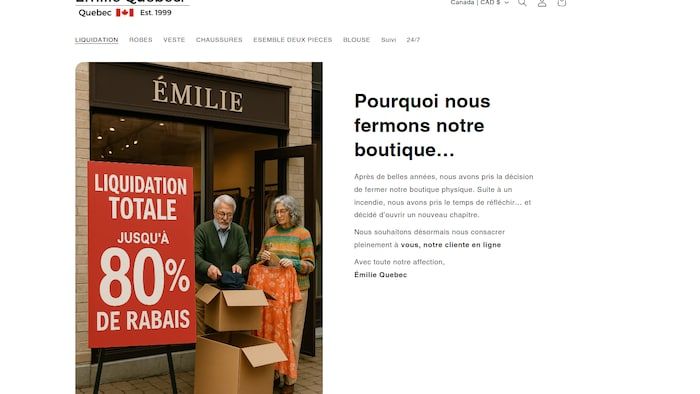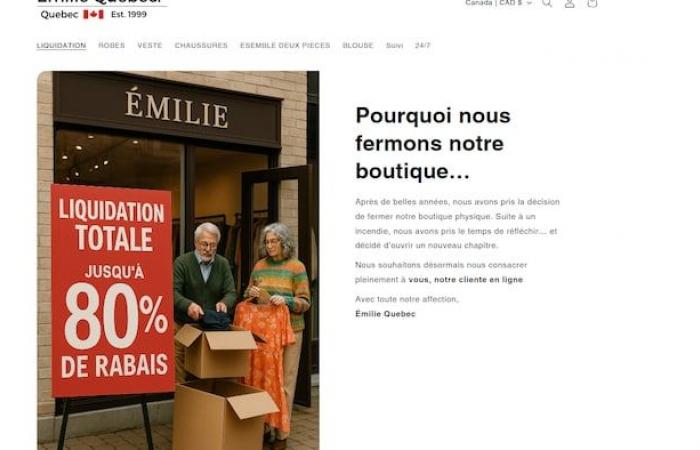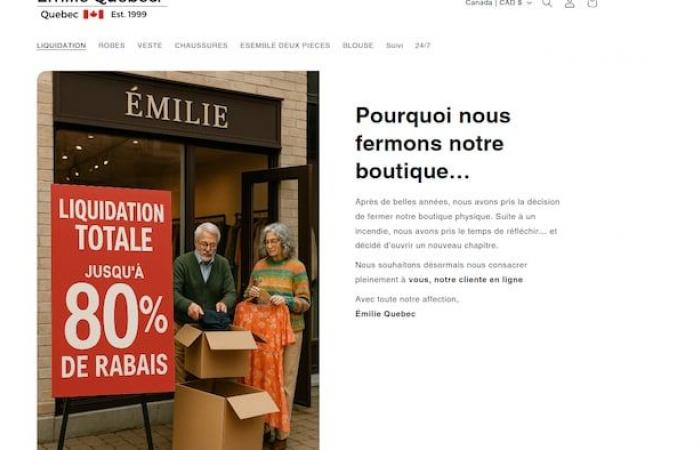“It is with great emotion that we announce that after 20 years of service, we must close our doors and liquidate our stocks. This statement is visible, with a few details, in hundreds of Facebook advertisements from online shops, many of which target Canadian customers. HIC: No one has heard of these shops … with the exception of fraud specialists.
For the Émilie Québec store, these are the market realities, the pressure of large chains and uprisings in the sector [qui] gradually made the maintenance of [leur] Small business impossible
can we read in a Facebook advertisement. There is only one solution left: put the key under the door and offer large discounts on the whole goods-assured clothes handmade in the workshop of Emilie, a seamstress with 20 years of profession.
Except that Émilie, the workshop and the store do not exist. Everything has been generated by artificial intelligence. The site does not have a physical address either, and the Facebook page of the store was only open two months ago.

Open in full screen
Several images on the Émilie Québec site have been generated by artificial intelligence.
Photo: Émilie Québec
However, Émilie Québec’s website is very real and hosted by the Canadian company Shopify. You can buy clothes there, such as a jacket at $ 85, a boon compared to the initial amount displayed of $ 170. But when we do an inverted search for the photo of the garment on a search engine, we see that this same piece is on sale for less than $ 20 on the Amazon platform, by a sender named Jinxings.
The quality of the objects received is also far from that announced. While we mentioned on the Emilie Québec website love natural materials
on Amazon, the same jacket is made 100 % in polyester, a synthetic material.
But who is behind Émilie Québec? According to the transparency tool of the Facebook page of the store, it is a site operated since the Netherlands.
Émilie Québec did not follow up on a request for an interview with Radio-Canada.
A practice sometimes legal, sometimes illegal
Buying a property on a website, which buys it from a supplier responsible for shipping it, is not illegal. This practice even has a name: parachuting, better known in English under the name of dropshipping. Amazon is a site of dropshipping
quotes as an example Sandrine Prom Tep, professor in the Marketing Department of the University of Quebec in Montreal (Uqam).

Open in full screen
Sandrine Prom Tep, professor in the UQAM marketing department.
Photo: Uqam
These are the False representations
or misleading advertisements, ignoring important facts, which constitute offenses to the law on consumer protection (LPC), warns the Consumer Protection Office (OPC) on its website.
For all these fraudulent shops, the story is significantly the same: a touching story on Facebook is told where longtime owners are forced to close their shop which often bears the name of a Canadian city. Stocks must be sold quickly and we offer large discounts.
This scratch swallows for two years
estimates Fyscillia Ream, coordinator at the research chair in cybercrime prevention and co-founder of the platform which lists the online scams fraud-elerte.ca.

Open in full screen
Fyscillia Ream, coordinator at the Cybercrime Prevention Chair of the University of Montreal.
Photo: Gracieuse of Fyscillia Ream
If, at the beginning, these fraudulent sites only sold products supposedly made in Quebec, for a few months, the tactics have become sophisticated, notes the specialist, to the point where people who were caught the first time falls back into the panel.
These sites now go there with touching stories [du genre] My grandmother must close her store and we sell the stock that remains. There is always this idea that these are Quebec products that we support the local economy. What we did not see before is the use of AI [pour incarner l’histoire avec des images].
On the Fraude-alerte.ca site, we quickly realize that Émilie Québec is only one example among others: Saint-Blanc Montréal, Elegance Toronto (become Toronto, then Avery Boutique), Maple Montreal (become North & Vale), Monique Québec, Fourthwave Vancouver (became Fourthave Vancouver), Sara Quebec, etc.
Hundreds of people are indignant at the services rendered by these sites in the comments on the Fraude-alerte.ca platform.
Lyne, for example, says he to have
By the Lamode-quebec.com site, now dismantled: The clothes are of poor quality. I really thought they were Quebec products. Now I’m waiting for a return code … in China and at my expense. What a scam.
It echoes what consumers want to hear. We feel guilty of buying, and we devastate ourselves by saying that at least, we buy Quebecois […] In an international context that makes it more important to buy local.
Radio-Canada contacted theOPCwhich redirected us to a warning published on March 14 against some people who seek to take advantage of the situation [avec les États-Unis] By attracting customers with websites in Quebec or Canadian colors and false allegations on the origin of their products
.
[L’intermédiaire] does not disclose any address or presents a false. He claims or gives the impression that he offers products from here, while the manufacturer is abroad. And that is without counting other possible problems of non-compliance or low value for money, the absence of after-sales service, etc.
mentions theOPC on this opinion.
A stratagem too accessible
?
Despite a warning of theOPCthese sites continue to proliferate online. For what? According to Sandrine Prom Tep, create a transactional site with Shopify East too easy and accessible
. Currently, a promotion allows you to create a site for $ 1 per month for the first three months, then from $ 49 for the following.
The return on investment for fraudsters is so important that even if they had to pay a little more accommodation costs, it is not so expensive for them.
Shopify However, would have an interest in acting against this scourge, according to the marketing specialist: As a service provider, if these platforms harm online trade – because in the end, there have been fraud problems -, Shopify will be affected. While waiting for everyone to realize it, however, they will make money.

Open in full screen
Shopify is a web platform allowing companies to sell their products online.
Photo : Radio-Canada
Same story on Meta side, which accepts advertisements from these sites on its platforms, according to Sandrine Prom Tep.
In February, the team of Decryptors had reported around thirty of these fraudulent advertisements (new window) In Meta, Facebook’s parent company, which deleted them all. Months later, the problem remains: there are still some 500 active announcements of the same ploy, only with the formula in English It is with a heavy heart
. And these sites do not only target Canadian customers. Meta’s advertising library has active ads like Melbourne and London too.
A spokesperson for the web giant had responded to Decryptors what The content which deliberately aims to deceive or exploit others for financial purposes breaks its policies
and thatIt is deleted when detected
.
We invest important resources to fight against this phenomenon that affects the entire industry, on our platforms and beyond. We also actively share advice to help people protect themselves, secure their accounts and avoid scams.
Ni Meta ni Shopify responded to requests from Radio-Canada interview.
What to do to protect yourself
Before making a purchase, the first step, according to Fyscillia Ream, would be to search online on the store. Look at the outgoing results. In the majority of cases for these sites, [vous verrez un signalement] on the fraud alerte.ca platform. […] check if customers are satisfied
she says.
Internet users can also do an online reverse research of products sold on the site, as Radio-Canada has done for the Veston of Émilie Québec, in order to check the origin of objects.
Another alarm signal to be monitored, still according to this specialist, is the absence of a postal address or telephone number on the website: A Quebec company that does not have a phone number, [c’est louche].
Already fell into the panel? First try to negotiate a reimbursement with the company, by proving the false declaration – an announced Quebec manufacturing garment, whose label indicates that it was made in China, for example. If the company refuses to resume objects at its expense, we can request a retrofing from our credit card transmitter while respecting certain deadlines.
Using Paypal is also an option […] But we often advise to turn to the credit card transmitter since the process is easier, and we have access to customer service in French
note Fyscillia Ream.
With information from Jeff Yates and Nicholas de Rosa












